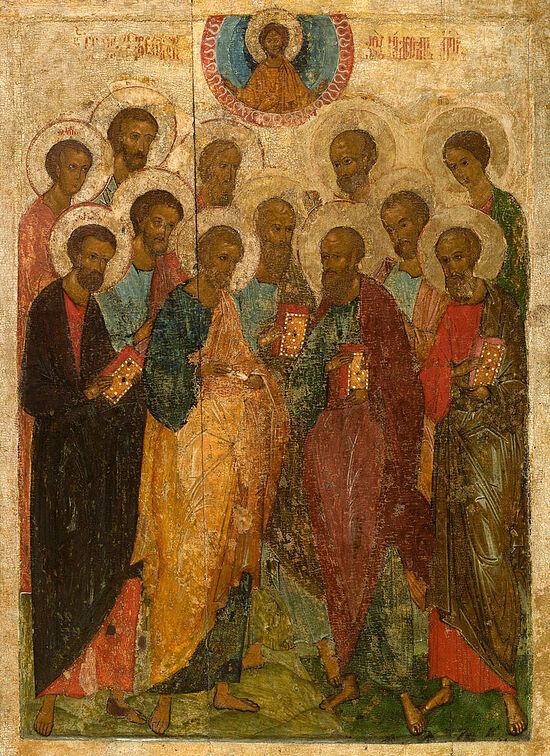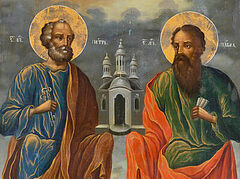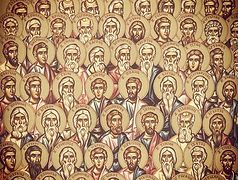Today the Church celebrates the memory of the twelve closest disciples of Christ.
We all remember that after the Ascension of the Savior at a meeting of the Jerusalem community of Christians, at the suggestion of Peter, Matthias was chosen by lot to replace the fallen Judas Iscariot, as one of those who were with us all the time when the Lord Jesus went in and out among us, starting from the baptism of John until that day, in which He ascended from us, he was with us a witness of his resurrection (Acts. 1, 14–26).
So, who are these apostles of Christ?
However, the books of the New Testament teach that it is not the physical proximity of a person to the incarnate God that brings Him closer, but the disposition of the heart and mind, the willingness to serve him with all his soul and all his strength, and—no less important—the ability to repent. For even one of the closest disciples, chosen by the Lord Himself among the twelve, who passed with Him along the roads of Galilee and Judea, who saw all His miracles and heard with His own ears all His sermons and teachings, who received the bread of the Eucharist from His hands, betrayed the Master and unable to repent, despaired and died a terrible and eternal death. And Saul, who had not seen Christ in the flesh and was burning with hatred for Him and His followers, was suddenly transformed in his mind and “more than other apostles”, worked for Him, building Churches throughout the inhabited earth. And Simon Bar Jonas, nicknamed Cephas (or “Stone”) for the firmness of faith, shook and stumbled…
The Church is strikingly honest and in her inspired books does not hide what any person, who planned to write the history of the organization, social movement, or political party he created would try to hide, “forget”, or correct, because he would write according to human reasoning, trying to evoke people’s respect, striving for magnificence and solemnity, polishing and varnishing all the rough еdges...
So, who are they, the apostles of Christ? We know about most of them from the traditions and stories included in their lives, but the Gospel, the book of Acts and their own epistles included in the New Testament tell us about the two chief apostles.
***
Yesterday, the Church prayerfully commemorated the Holy Apostles Peter and Paul—according to tradition, the day of their martyrdom, the crucifixion in Rome of the Galilean fisherman Peter and the beheading by the sword of the Roman citizen Paul.
In the Life of Peter it is said that when he left Rome, where the emperor Nero sought to put him to death, Christ appeared to him on his way out of the city:
“Where are you going, Lord?” Peter asked.
“I am going to Rome to be crucified again,” the Lord answered him.
What was Peter thinking then? What did you remember?
His fervent promise to the Master in the upper room of Zion to die for Him (cf. Jn. 13:37-38) and his rapid threefold denial with an oath: “I do not know this Man” in the courtyard of Caiaphas (cf. Jn. 18:17-27)?
A denial, much mourned and forgiven by Christ at the sea of Tiberias. And a promise, for which the time to fulfill it had come…
What was Paul thinking about in a Roman prison when he wrote to Timothy: For I am already becoming a sacrifice, and the time of my departure has come... (2 Tim. 4:6)? That according to the Law, without the shedding of blood there is no forgiveness (Heb. 9, 22), and he himself is guilty of shedding the blood of Deacon Stephen, who was stoned with his approval (Acts. 7:58–60; 8:1), and in the blood of his fellow tribesmen who believed in Christ, on whom he breathed threats and murder (Acts 9, 1) and whom he dragged into prison (cf. Acts 8, 3), for which he called himself a monster (1 Cor. 15:8)?.. [the Greek is usually translated “one born out of due time” (KJV)—a miscarriage—whereas the Slavonic reads “monster, fiend, pervert”]
The whole subsequent life of Apostles Peter and Paul is their active, long–term repentance for their sin. They expiated their guilt with many labors, just like the other apostles who promised the Master to be with Him until death (Matt. 26:31–35), but left Him alone in the Garden of Gethsemane, with an angry crowd of zealots of the law armed with stakes... And, perhaps that is why all of them, having worked hard in preaching, still ended their earthly journey as martyrs—fulfilling (albeit belatedly) their promise to die for their Master and Lord…
Except for one—young John, who fulfilled his promise that night, at the judgment of Caiaphas, and the next day, staying with the Master at the Cross on Calvary to see the end and hear the last words of the Savior…
***
But we Christians of the end times, after two millennia—are we not guilty before our Lord and Master of not fulfilling our Baptismal vows and repeated promises at confession “to sin no more”? Do we not also, like Peter, renounce Christ (often unnoticed by ourselves) by simply not fulfilling His commandments, thereby showing that we do not love Him (cf. Jn. 14:15, 23)?
Don’t we, like Peter, renounce Christ by simply not fulfilling His commandments?
What kind of Christians are we, and what of Christ is in us if everyone who sins has not seen Him and has not known Him (1 Jn. 3:6)? Is there not too much of the devil in us? For whoever commits sin is of the devil, because the devil sinned first (1 Jn. 3:8).
And if we do not even love our neighbors (not to mention our enemies), if we slander them, take revenge, harass them with reproaches, condemnation, irritation, anger and other by no means Christian properties of our soul and character, if we discuss and condemn the clergy and the priesthood, then are we not persecuting the Church, like Saul?
This is why the Church has established for us a lengthy apostolic fast with the obligatory (according to the rubrics) penitential prayer of St. Ephraim the Syrian, in order to call us to active correction, following the example of Sts. Peter, Paul and the other apostles, who were people just like us who sinned, erred, but corrected their mistakes and atoned for their guilt before the Lord, before Whom each of us is guilty in his own measure, and therefore is called by the Church to repentance and atonement...
And may our helpers and intercessors—the holy apostles—help us in this! Through their prayers and intercessions, may the Lord Jesus Christ forgive and have mercy on us!




